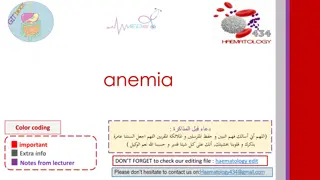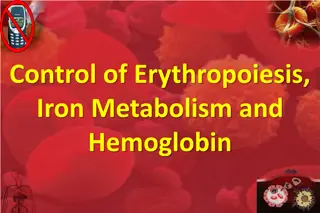Introduction to Haematopathology - Understanding Blood Cell Disorders
Haematopathology is the study of diseases related to blood cells and their production. This branch of pathology delves into haemopoiesis, normal blood constituents, anemia, polycythemia, and more. Learn about erythropoiesis, different blood cell types, erythropoietin, haemoglobin, and disorders like
1 views • 31 slides
Understanding Anemia: Key Concepts and Clinical Features
Anemia is a common condition characterized by a reduction in hemoglobin levels, leading to decreased oxygen-carrying capacity in the blood. This article delves into important aspects such as hematopoiesis, erythropoiesis, hemoglobin synthesis, and clinical manifestations of anemia. Learn about the s
0 views • 18 slides
Understanding Erythropoiesis, Iron Metabolism, and Hemoglobin Regulation
Explore the intricate control of erythropoiesis, iron metabolism, and hemoglobin synthesis in the body. Delve into the role of erythropoietin, factors influencing erythropoiesis rate, essential nutrients like iron and vitamins, and clinical conditions associated with anomalies in these processes. Ga
0 views • 25 slides
Overview of Blood and Hematology: Functions and Composition
The human body consists mostly of water, with blood making up approximately 8% of body weight. Blood is composed of plasma and formed elements, including red blood cells (erythrocytes), white blood cells (leukocytes), and platelets. Plasma, the liquid part of blood, contains various proteins such as
0 views • 12 slides



